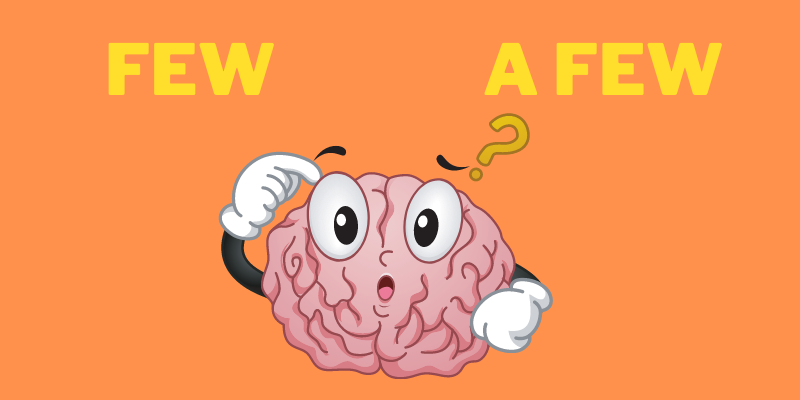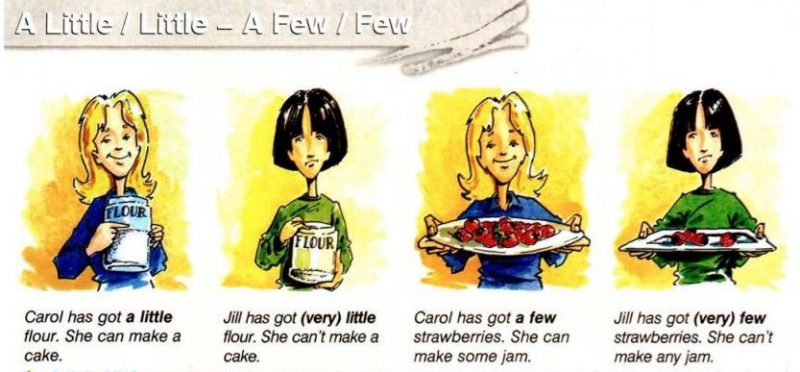Làm thế nào để nhận biết giữa few, a few, little và a little một cách dễ dàng theo ngữ pháp tiếng Anh?
Trong bài viết này, hãy cùng chúng tôi khám phá câu trả lời cho câu hỏi này nhé!
Những từ này có vẻ tương tự, nhưng thực tế là cách sử dụng và nghĩa lại rất khác nhau đấy.
Tiếp tục đọc để khám phá ngay!
1 – Phân Biệt Few Và A Few
Cách sử dụng từ few
Few mang ý nghĩa “rất ít”, không nhiều, “chỉ một vài” và thường đi kèm với các danh từ có thể đếm được.
Ví dụ:
Few people gathered in front of the door.(Chỉ có rất ít người tụ tập trước cửa)
Làm thế nào để sử dụng a few
A few cũng thường được áp dụng với các danh từ có thể đếm, và có ý nghĩa là “một ít” (đủ để sử dụng)
Ví dụ:
I have a few books that you may like. (Tớ có vài quyển sách mà tớ nghĩ cậu sẽ thích)
2 – Phân Biệt Little Và A Little
Làm thế nào để sử dụng little
Little thường được áp dụng với các danh từ không đếm được. Little mang tính chất phủ định và có ý nghĩa là “rất ít”.
Ví dụ:
We have little money. (Chúng tôi có rất ít tiền)
Làm thế nào để sử dụng a little
A little thường xuất hiện trước các danh từ không đếm được và mang nghĩa “một ít”, “một chút”.
Ví dụ:
I just have a little flour to make a cake.(Tôi chỉ có một chút bột mì để làm một chiếc bánh)

3 – A Few A Little, Few Và Little Khác Nhau Ở Điểm Nào? Một Số Ghi Chú Khi Sử Dụng
Điểm đặc biệt giữa few, a few và little, a little là gì:
- Few, a few: sử dụng với danh từ có thể đếm
- Little, a little: áp dụng với danh từ không đếm được.
Ngoài ra, khi có từ “a”, ý nghĩa của cụm từ sẽ trở nên tích cực hơn. Cụ thể:
- Few, little: rất ít, gần như không, không đủ, ít hơn mong đợi.
- a few, a little: chỉ một ít, vài thôi nhưng đủ dùng, nhiều hơn mong đợi, vẫn hơn là không có.
- (A) little of và (a) few of đứng trước các đại từ hạn định như my, these, the,… thể hiện tính xác định của chủ thể.
Ví dụ:
A few students like literature.(Chỉ có một vài học sinh thích môn Văn)
A few students of the class like literature.(Chỉ một vài học sinh của lớp này thích môn Văn)
Could I try a little juice?(Tôi có thể thử chút nước ép không?)
Could I try a little of your juice?(Tôi có thể thử chút nước ép của bạn được không?)
- Little và few (nếu không đi kèm với mạo từ) thường mang tính chất trang trọng. Trong cuộc trò chuyện thông thường, chúng ta thường sử dụng only a little/few hoặc very little/few.
Ví dụ:
He’s got very few friends.(Anh ấy có rất ít bạn bè)
They have very little patience. (Họ rất thiếu kiên nhẫn)
- Trong trường hợp (a) few/little đã thể hiện rõ ý nghĩa, bạn có thể lược bỏ danh từ.
Ví dụ:
Some more milk?
Just a little, please.
(Thêm sữa nữa nhé?Chỉ một chút thôi)
- (a) little/ few thường đứng trước danh từ nhưng không đứng sau be
Ví dụ:
They had little time. (Họ có rất ít thời gian)
Không sử dụng: Thời gian của họ quá ít.
- (a) little có thể được dùng để bổ nghĩa trong câu so sánh hơn.
Ví dụ:
The new student in our class is a little taller than John.(Học sinh mới của lớp tôi thì cao nhỉnh hơn John một xíu)
- Little thường không được sử dụng để bổ sung cho tính từ và trạng từ.
Ví dụ:
It’s not very interesting.(Nó chẳng thú vị cho lắm)
Không sử dụng: Điều đó không thú vị mấy.
- A little có thể có ý nghĩa tiêu cực, chỉ trích, và đặt trước tính từ và trạng từ.
Ví dụ:
She arrived a little late.(Cô ấy đến có hơi muộn một chút)

4 – Phân Biệt Few Và Less
Less là biến thể so sánh của little, vì vậy less thường được sử dụng với danh từ không đếm được.
Fewer là dạng so sánh của few và xuất hiện trước danh từ đếm được số nhiều.
Ví dụ:
My mom earns less money than my father.(Mẹ tôi kiếm được ít tiền hơn bố tôi)
I have fewer toys than my brother.(Tôi có ít đồ chơi hơn em tôi).
Đôi khi bạn có thể gặp “less” đứng trước danh từ số nhiều, nhưng điều này được coi là không chính xác, thường xuất hiện trong ngữ cảnh không quá trang trọng.
Ví dụ:
I’ve got less problems than before.(Tôi gặp ít vấn đề hơn so với trước kia)
- Less of và fewer of thường đi trước đại từ và các giới từ hạn định như this, my, the,…
Ví dụ:
There are fewer of the student graduate from this school each year.(Mỗi năm lại có ít học sinh tốt nghiệp từ trường này hơn)
I’d like to spend less of my money buying cosmetics.(Tôi muốn dành ít tiền hơn để mua mỹ phẩm)
Chú ý: Nếu trước danh từ không có giới từ xác định, không sử dụng of. (Không sử dụng: fewer of students, less of milk,…)
2. Khi less và fewer đã truyền đạt ý nghĩa rõ ràng, có thể loại bỏ danh từ sau đó.
Ví dụ:
Some people want to resign the contract, but fewer than last year.(Vẫn có một số người muốn ký tiếp hợp đồng, nhưng ít hơn năm ngoái).
3. Lesser
Lesser với ý nghĩa “ít hơn”, “nhỏ hơn”, “không nhiều lắm” đôi khi được áp dụng trong bối cảnh trang trọng.
Ví dụ:
She usually love to read the some lesser-known writers .(Cô ấy thường thích đọc sách của các nhà văn ít được biết đến hơn)
5 – Cách Sử Dụng A Bit
Một chút mang ý nghĩa tương tự như một ít và thường được sử dụng như một trạng từ.
Ví dụ:
Can you drive a bit slower?(Cậu có thể lái xe chậm hơn chút được không?)
Wait a bit. (Chờ một chút)
Khi không ở dạng so sánh, một chút thường kết hợp với một tính từ có ý nghĩa phủ định hoặc chỉ trích điều gì đó.
Ví dụ:
That dress is a bit expensive.(Chiếc váy đó có hơi đắt)
He is a bit old for this position.(Anh ấy có hơi lớn tuổi với công việc này)
- Một chút của một thường đứng trước một số danh từ trong giao tiếp thân mật, có ý nghĩa là “hơi” hoặc “khá”.
Ví dụ:
She is a bit of fool. (Cô ấy khá ngốc nghếch)
- Trong giao tiếp thân mật, not a bit có nghĩa là “không hề một chút nào” tương tự như not at all.
Ví dụ:
I’m not a bit tired.
(Tớ chẳng thấy mệt chút nào)

6 – Bài Tập Thực Hành
Bài 1: Điền các từ few, a few, little, a little vào chỗ trống phù hợp.
- We have _____________ time left. Let’s try to get finished quickly.
2. You have _____________ ideas left, so let’s hear them.
3. I have got very _____________ friends, so I’m alone most of the time.
4. Would you like _____________ water?
5. What you need is _____________ more self-confidence.
6. _____________ is known about how the disease spreads.
7. I’m sorry, but I speak _____________ Spanish. Can’t we communicate in English?
8. Very _____________ people went to see the movie.
9. Mary managed to get _____________ piece of cake.
10. She saves _____________ money every month because she wants to go on a cruise next summer.
11. There are _____________ posts that are really worth reading. Most of them are rubbish.
12. I have drunk _____________ water today, so I guess that’s why I’m so thirsty.
13. There are _____________ good books that I would recommend reading.
14. Have you got any money left in your bank account? Yes, I have _____________, but not very much.
15. There are _____________ cities in the world that have a multicultural society.
16. There was _____________ time to finish the project, so we had to work on weekends.
17. We stayed in New York for _____________ days before moving on to the Midwest.
18. I’d like to tell you _____________ about my childhood.
19. I made very _____________ mistakes, so I got a very good mark.
20. I see _____________ reason for giving him _____________ days off.
Đáp án:
1. We have little time left. Let’s try to get finished quickly.
2. You have a few ideas left, so let’s hear them.
3. I have got very few friends, so I’m alone most of the time.
4. Would you like a little water?
5. What you need is a little more self-confidence.
6. Little is known about how the disease spreads.
7. I’m sorry, but I speak little Spanish. Can’t we communicate in English?
8. Very few people went to see the movie.
9. Mary managed to get a little piece of cake.
10. She saves a little money every month because she wants to go on a cruise next summer.
11. There are few posts that are really worth reading. Most of them are rubbish.
12. I have drunk little water today, so I guess that’s why I’m so thirsty.
13. There are a few good books that I would recommend reading.
14. Have you got any money left in your bank account? Yes, I have a little, but not very much.
15. There are few / a few cities in the world that have a multicultural society.
16. There was little time to finish the project, so we had to work on weekends.
17. We stayed in New York for a few days before moving on to the Midwest.
18. I’d like to tell you a little about my childhood.
19. I made very few mistakes, so I got a very good mark.
20. I see little reason for giving him a few days off.
Bài 2: Điền a little, little, a few, few vào chỗ trống trong những câu sau
1. I have _______ water left. There’s enough to share.
2. I have _______ good friends. I’m not lonely.
3. He has _______ education. He can’t read or write, and he can hardly count.
4. There are _______ people she really trusts. It’s a bit sad.
5. We’ve got _______ time at the weekend. Would you like to meet?
6. Julie gave us _______ apples from her garden. Shall we share them?
7. She has _______ self-confidence. She has a lot of trouble talking to new
people.
8. There are _______ women politicians in the UK. Many people think there
should be more.
9. It’s a great pity, but the hospital has _______ medicine. They can’t help many
people.
10. I’ve got _______ cakes to give away. Would you like one?
11. There’s _______ milk left in the fridge. It should be enough for our coffee.
12. _______ children from this school go on to university, unfortunately.
13. Do you need information on English grammar? I have _______ books on the
topic if you would like to borrow them.
14. She’s lucky. She has _______ problems.
15. London has _______ sunshine in the winter. That’s why so many British
people go on holiday to sunny places!
16. There’s _______ spaghetti left in the cupboard. Shall we eat it tonight?
17. There are _______ programmes on television that I want to watch. I prefer to
download a film or read a book.
18. He has _______ free time. He hardly ever even manages to call his mother!
19. Unfortunately, I have _______ problems at the moment.
20. Are you thirsty? There’s _______ juice left in this bottle, if you’d like it.
Đáp án:
1. I have a little water left. There’s enough to share.
2. I have a few good friends. I’m not lonely.
3. He has little education. He can’t read or write at all, and he can hardly count.
4. There are few people she really trusts. It’s a bit sad.
5. We’ve got a little time at the weekend. Would you like to meet?
6. Julie gave us a few apples from her garden. Shall we share them?
7. She has little self-confidence. She has a lot of trouble talking to new people.
8. There are few women politicians in the UK. Many people think there should be more.
9. It’s a great pity, but the hospital has little medicine. They can’t help many people.
10. I’ve got a few cakes to give away. Would you like one?
11. There’s a little milk left in the fridge. It should be enough for our coffee.
12. Few children from this school go on to university, unfortunately.
13. Do you need information on English grammar? I have a few books on the topic if you would like to borrow them.
14. She’s lucky. She has few problems.
15. London has little sunshine in the winter. That’s why so many British people go on holiday to sunny places!
16. There’s a little spaghetti left in the cupboard. Shall we eat it tonight?
17. There are few programmes on television that I want to watch. I prefer to download a film or read a book.
18. He has little free time. He hardly ever even manages to call his mother!
19. Unfortunately, I have a few problems at the moment.
20. Are you thirsty? There’s a little juice left in this bottle, if you’d like it.
Bài 3: Điền a few hoặc a little vào các câu sau:
- There are ___ students at the bus stop. I can see only ___ apples in the bowl. The cook is putting ___ olive oil into the vegetable soup. I want ___ sugar for my tea.Can you add it,please? Ruby wants to take ___ photographs of the birds. I want ___ jam on my bread.I like jam and bread. There are ___ coloured pencils and a book on the table. Mr.Turner is carrying ___ boxes.He doesn’t need any help. Dad,I have got only ___ homework today.Can you help me,please? Suzy has got ___ kittens.She wants to sell them. You are very fat,dear.You should only eat ___ bread every day. I think I will add ___ ketchup to my chips.I like ketchup. ___ painters are painting the wall. They are using green and yellow. I’m having a difficult exam and I have got only ___ time. Susan needs ___ cucumbers for the salad. Look! ___ birds are flying over that yellow house. Mr.Sad is unhappy because he has got only ___ money. ___ racers are running to the finish line. Sir,I have got ___ questions about the plan. There is only ___ water in that glass.I want some more. My grandmother adds ___ flour to the omelette. There are ___ easter eggs in front of the rabbit.
Đáp án:
- a few a few A little a little a few a little a few a few a little a few a little a little a few a little a few a few a little a few a few a little a little a few

Trên đây là những kiến thức cơ bản nhất về cách phân biệt các từ chỉ lượng few, a few, little, và a little.
Nếu bạn chưa biết đến chúng, hy vọng sau bài viết này bạn sẽ có thêm nhiều kiến thức hữu ích để sử dụng few, a few, little, a little một cách mạch lạc trong tương lai.
Nếu bạn đã quá quen thuộc với những từ này, hãy xem đây là cơ hội để làm cho kiến thức hiện tại của bạn mạnh mẽ hơn và ôn lại cơ bản tiếng Anh.
Đừng quên áp dụng ngay lý thuyết vào các bài tập thực hành ở phần 5. Chúc bạn học tiếng Anh thật vui vẻ!
Hãy like, share bài viết này và theo dõi aten thường xuyên để cập nhật những kiến thức hữu ích mà chúng tôi sẽ chia sẻ trong thời gian tới nhé!


